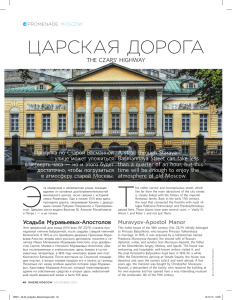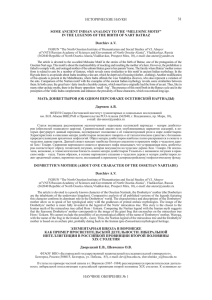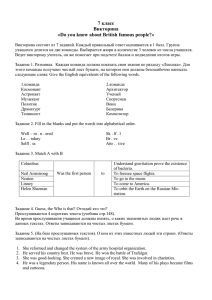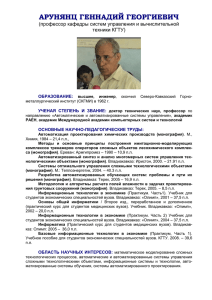ИСТОРИЧЕСКИЕ НАУКИ НАУЧНОЕ ОБОЗРЕНИЕ № 1 MEXICAN
advertisement
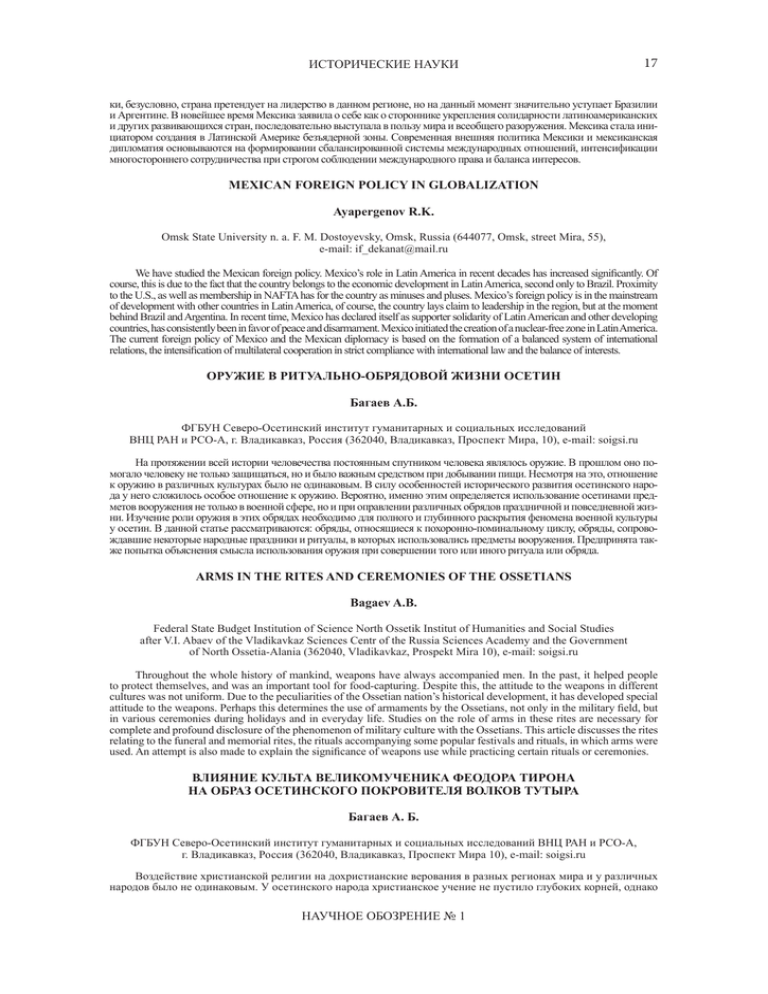
ИСТОРИЧЕСКИЕ НАУКИ 17 ки, безусловно, страна претендует на лидерство в данном регионе, но на данный момент значительно уступает Бразилии и Аргентине. В новейшее время Мексика заявила о себе как о стороннике укрепления солидарности латиноамериканских и других развивающихся стран, последовательно выступала в пользу мира и всеобщего разоружения. Мексика стала инициатором создания в Латинской Америке безъядерной зоны. Современная внешняя политика Мексики и мексиканская дипломатия основываются на формировании сбалансированной системы международных отношений, интенсификации многостороннего сотрудничества при строгом соблюдении международного права и баланса интересов. MEXICAN FOREIGN POLICY IN GLOBALIZATION Ayapergenov R.K. Omsk State University n. a. F. M. Dostoyevsky, Omsk, Russia (644077, Omsk, street Mira, 55), e-mail: if_dekanat@mail.ru We have studied the Mexican foreign policy. Mexico’s role in Latin America in recent decades has increased significantly. Of course, this is due to the fact that the country belongs to the economic development in Latin America, second only to Brazil. Proximity to the U.S., as well as membership in NAFTA has for the country as minuses and pluses. Mexico’s foreign policy is in the mainstream of development with other countries in Latin America, of course, the country lays claim to leadership in the region, but at the moment behind Brazil and Argentina. In recent time, Mexico has declared itself as supporter solidarity of Latin American and other developing countries, has consistently been in favor of peace and disarmament. Mexico initiated the creation of a nuclear-free zone in Latin America. The current foreign policy of Mexico and the Mexican diplomacy is based on the formation of a balanced system of international relations, the intensification of multilateral cooperation in strict compliance with international law and the balance of interests. ОРУЖИЕ В РИТУАЛЬНО-ОБРЯДОВОЙ ЖИЗНИ ОСЕТИН Багаев А.Б. ФГБУН Северо-Осетинский институт гуманитарных и социальных исследований ВНЦ РАН и РСО-А, г. Владикавказ, Россия (362040, Владикавказ, Проспект Мира, 10), e-mail: soigsi.ru На протяжении всей истории человечества постоянным спутником человека являлось оружие. В прошлом оно помогало человеку не только защищаться, но и было важным средством при добывании пищи. Несмотря на это, отношение к оружию в различных культурах было не одинаковым. В силу особенностей исторического развития осетинского народа у него сложилось особое отношение к оружию. Вероятно, именно этим определяется использование осетинами предметов вооружения не только в военной сфере, но и при оправлении различных обрядов праздничной и повседневной жизни. Изучение роли оружия в этих обрядах необходимо для полного и глубинного раскрытия феномена военной культуры у осетин. В данной статье рассматриваются: обряды, относящиеся к похоронно-поминальному циклу, обряды, сопровождавшие некоторые народные праздники и ритуалы, в которых использовались предметы вооружения. Предпринята также попытка объяснения смысла использования оружия при совершении того или иного ритуала или обряда. ARMS IN THE RITES AND CEREMONIES OF THE OSSETIANS Bagaev A.B. Federal State Budget Institution of Science North Ossetik Institut of Humanities and Social Studies after V.I. Abaev of the Vladikavkaz Sciences Centr of the Russia Sciences Academy and the Government of North Ossetia-Alania (362040, Vladikavkaz, Prospekt Mira 10), e-mail: soigsi.ru Throughout the whole history of mankind, weapons have always accompanied men. In the past, it helped people to protect themselves, and was an important tool for food-capturing. Despite this, the attitude to the weapons in different cultures was not uniform. Due to the peculiarities of the Ossetian nation’s historical development, it has developed special attitude to the weapons. Perhaps this determines the use of armaments by the Ossetians, not only in the military field, but in various ceremonies during holidays and in everyday life. Studies on the role of arms in these rites are necessary for complete and profound disclosure of the phenomenon of military culture with the Ossetians. This article discusses the rites relating to the funeral and memorial rites, the rituals accompanying some popular festivals and rituals, in which arms were used. An attempt is also made to explain the significance of weapons use while practicing certain rituals or ceremonies. ВЛИЯНИЕ КУЛЬТА ВЕЛИКОМУЧЕНИКА ФЕОДОРА ТИРОНА НА ОБРАЗ ОСЕТИНСКОГО ПОКРОВИТЕЛЯ ВОЛКОВ ТУТЫРА Багаев А. Б. ФГБУН Северо-Осетинский институт гуманитарных и социальных исследований ВНЦ РАН и РСО-А, г. Владикавказ, Россия (362040, Владикавказ, Проспект Мира 10), e-mail: soigsi.ru Воздействие христианской религии на дохристианские верования в разных регионах мира и у различных народов было не одинаковым. У осетинского народа христианское учение не пустило глубоких корней, однако НАУЧНОЕ ОБОЗРЕНИЕ № 1 18 HISTORICAL SCIENCE оказало определенное влияние на многие обряды и ритуалы религиозного культа. Божества осетинского пантеона, с официальным принятием учения Христа, потеряли свои дохристианские теонимы и получили имена христианских святых, кроме того, вероятно, христианство оказало определенное влияние и на их культы и облик. Данное исследование посвящено освещению степени влияния христианства на древнеосетинский культ покровителя волков и воинов Тутыра. В работе, на основе данных осетинской мифологии и фольклора, проанализирован образ Тутыра. Рассмотрены жития великомученика Феодора Тирона. В рамках тех религиозных систем, к которым принадлежат оба культа, исследованы их функции. Обнаружены точки соприкосновения двух культов и предпринята попытка объяснения причин, по которым покровитель волков и воинов у предков осетин в период христианизации получил имя св. Феодора Тирона. THE IMPACT OF THE CULT OF THE GREAT MARTYR THEODORE TYRONE ON THE IMAGE OF THE OSSETIAN PATRON OF WOLVES TUTYR Bagaev A.B. Federal State Budget Institution of Science North Ossetik Institut of Humanities and Social Studies after V. I. Abaev of the Vladikavkaz Sciences Centr of the Russia Sciences Academy and the Government of North Ossetia – Alania (362040, Vladikavkaz, Prospekt Mira, 10), e-mail: soigsi.ru The impact of Christianity on the pre-Christian beliefs in different regions of the world and among various peoples was not homogeneous. The roots of the Christian doctrine did not go deep among the Ossetian people, however, it certainly affected many rites and rituals of the religious faith. With the official acceptance of the Christ’s doctrine the deities of the Ossetian pantheon lost their pre-Christian theonyms and accepted the names of Christian saints; in addition, Christianity probably had certain influence on their cults and appearance. This study focuses on highlighting the level of impact of Christianity on the ancient Ossetian cult of Tutyr – the patron of wolves and warriors. In this paper, the image Tutyr was analyzed on the bases of the data from the Ossetian mythology and folklore. The martyrology of the Great Theodore Tyrone was studied. In the framework of the religious systems that both cults refer to, their functions were studied. The things common to both cults were discovered, and an attempt was made to explain the reasons why the patron of wolves and warriors of the Ossetians’ ancestors was named as St. Theodore Tyrone in the period of Christianization. ХОЗЯЙСТВЕННО-ЭКОНОМИЧЕСКАЯ ДЕЯТЕЛЬНОСТЬ РУССКОЯЗЫЧНОГО НАСЕЛЕНИЯ МОЗДОКА И ВЛАДИКАВКАЗА (В КОНЦЕ XVIII-XIX ВВ.) Бадов Ч.Р. ФГБОУ ВПО «Северо-Осетинский Государственный Университет им. К.Л. Хетагурова», (362025, РСО-Алания, г. Владикавказ, ул. Ватутина, 44-46), e-mail: vanbadov@mail.ru В статье рассматривается развитие хозяйственно-экономической деятельности русскоязычного населения двух крупнейших городов Северной Осетии. Моздок и Владикавказ играли огромную роль в хозяйственной жизни как Владикавказского округа, так и всего Северного Кавказа. Автор подробно описывает все аспекты хозяйствования русских горожан, их вовлечённость в ремесленное и сельскохозяйственное производство, торговлю. Анализируется уровень промышленного развития Владикавказа, который достиг в этом значительных успехов, в сравнении со слаборазвитой промышленностью Моздока. Определена роль ярмарочной торговли в Моздоке и Владикавказе, анализируются причины упадка этого вида торговой деятельности. В заключении сделан вывод о хозяйственной активности русских горожан Моздока и Владикавказа, которые не имели своей отдельной ниши в городской экономике, а были вовлечены во все сферы хозяйственно-экономической структуры. THE ECONOMIC ACTIVITY OF RUSSIAN-SPEAKING POPULATION OF MOZDOK AND VLADIKAVKAZ (IN THE XVIII - XIX CENTURY) Badov C.R. North-Ossetian State University after K.L. Hetagurov, (362025, Republic North Ossetia-Alania, Vladikavkaz, Vatutina Str., 44- 46), e-mail: vanbadov@mail.ru The article deals with the development of the economic activity of the Russian-speaking population in two largest towns of North Ossetia. Mozdok and Vladikavkaz played a huge role in the economic life both of Vladikavkaz County and the North Caucasus as well. The author describes in detail all aspects of economic management of Russianspeaking citizens, their involvement in handicraft and agricultural production and trade. The author analyzes the level of industrial development of Vladikavkaz, which reached the significant progress compared with the less-developed industry of Mozdok. The author defines the role of the fair trade in Mozdok and Vladikavkaz, analyzes the reasons for the decline of this type of trading activity. Finally, the author makes a conclusion about the economic activity of the Russian-speaking citizens in Mozdok and Vladikavkaz who did not have their own space in the urban economy and they were involved in all aspects of the economic structure. SCIENTIFIC REVIEW № 1
